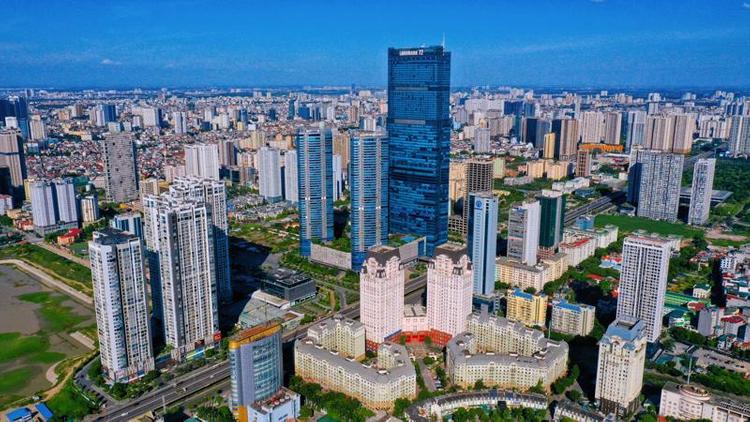Real estate market "trying to make a profit"
In many meetings related to real estate, the Ministry of Construction and many experts have warned about the "phase difference" in segments. Accordingly, the affordable apartment and social housing segments are in serious shortage. On the contrary, the luxury apartment segment, priced at hundreds of millions of VND per square meter, continues to "explode" in the market.

The Vietnamese real estate market continues to record the launch of many Class A apartment projects, however, the absorption rate of these projects is low, leading to a "stale" situation. (Photo: CP)
With sky-high prices, luxury and super-luxury apartments are not aimed at the majority of people who want to buy a house. This leads to a market that is both oversupplied and undersupplied with housing.
Until the end of the third quarter of 2023, this trend will continue to expand, when the apartment supply is mainly in the class A segment. In particular, the project absorption rate remains low, which shows that many projects are "unsold".
According to BHS Group's report, in the third quarter of 2023, the supply of apartments nationwide continued to decrease. Accordingly, in the third quarter, the entire market had 13,600 apartments launched, down 28% compared to the previous quarter, down 20% compared to the same period last year.
In Hanoi alone, the primary supply in the third quarter of 2023 reached about 4,700 units, down 11% quarter-on-quarter and only 55% of the supply in the same period last year. The supply is mainly inventory from the previous quarter, with very few projects opening new units.
By segment, Grade A apartments continue to hold the largest proportion, accounting for nearly 50% of primary supply in the third quarter of 2023.
In particular, class A and B products continue to dominate the Hanoi market, with nearly 90% of total sales in the quarter. Class C products only have about 500 units left, which are inventory in some existing projects in Thanh Tri, Hoang Mai, and Dong Anh areas.
Similarly, in Ho Chi Minh City, in the third quarter of 2023, the primary supply of apartments in Ho Chi Minh City is estimated at about 8,900 units, exceeding 300 units compared to the same period last year.
The supply of class A apartments is still the key supply source of the HCMC market. In addition, class C products are almost disappearing from the market, maintaining inventory at about 1% of the city's total supply. Other segments have almost no fluctuations.
Also according to BHS Groups, in the third quarter of 2023, project absorption rates in Hanoi and Ho Chi Minh City were both low.
For example, in Hanoi, the project absorption rate is only about 60% compared to last year. Meanwhile, in Ho Chi Minh City, although supply has increased, the project absorption rate is only half compared to the same period last year.
Vietnamese people need at least 23.5 years of income to buy a house.
Currently, housing prices in Hanoi and Ho Chi Minh City are constantly rising. Reports from many real estate market research companies have shown that the average apartment price in Hanoi has approached 50 million VND/m2, while in Ho Chi Minh City, the average price is 52 - 53 million VND/m2.
Thus, to own a 2-bedroom apartment, about 60 square meters, people have to spend at least 3 billion VND to "dream" of buying a house.
According to Dr. Can Van Luc, with an apartment costing about 3 billion VND, equivalent to an apartment in the B segment, Vietnamese people have to spend more than 10 million VND/month for 23.5 years to buy a house.
“Regarding prices, currently, Vietnam’s real estate prices are relatively high compared to the income of the majority of people. The average Vietnamese person needs at least 23.5 years of income to buy a house, ranking 14th out of 107 countries (the higher, the more expensive) in the world , equivalent to Thailand, South Korea (while our income is lower than theirs); much higher than Indonesia (18.5 years), Singapore (15.5 years), India (9.2 years) and Malaysia (8.1 years)….”, Mr. Luc analyzed.
According to Mr. Luc, the main reasons are limited supply, a serious lack of affordable housing and surplus in some other segments (especially the high-end segment), high costs in all stages of project implementation,...
Therefore, many experts believe that if the market is to have high liquidity and not be "unsold" as it is now, it is necessary to develop affordable housing products.
Source



































































































Comment (0)